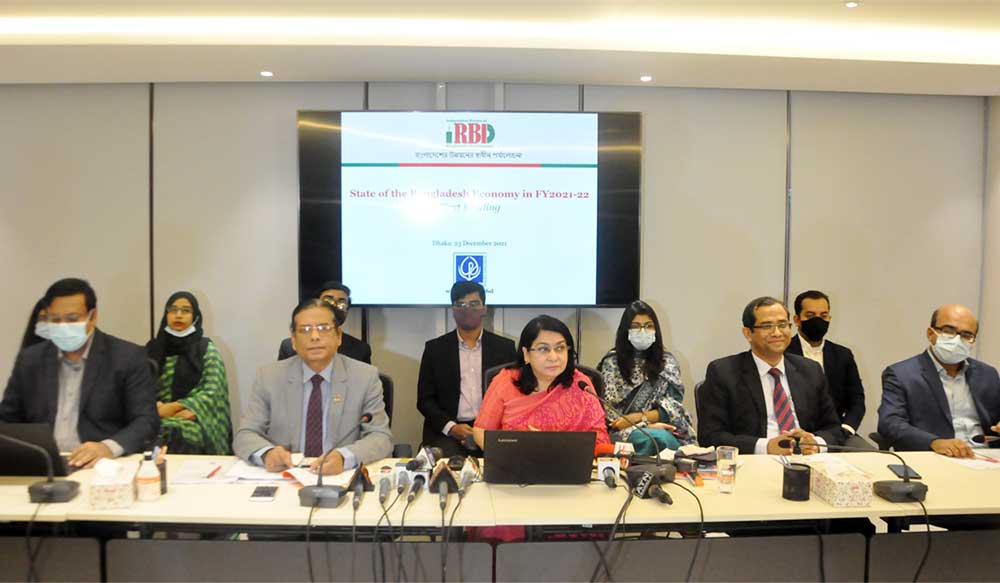
The trends of key macroeconomic correlates during the early months of FY22 evince that many of these are in a recovery trajectory, led by export-oriented sectors. However, macroeconomic stability is not in a comfortable state anymore. Uncertainty is looming large at the global level as well. Consequently, the policy space for tackling prevailing and emerging challenges has become comparatively limited. In this backdrop, trends in recovery, emergent risks and the available policy space should receive due cognisance while designing and implementing policy responses.
The government needs to opt for a focused and targeted expansionary fiscal policy reinforced by accommodative monetary policy. Given the current context, a targeted flow of fiscal resources towards the more vulnerable households alongside the relatively small (and informal) enterprises will generate more ‘aggregate domestic demand augmenting’ effect and offer some protection to the marginalised groups. This becomes even more important given the upward creeping inflation scenario.
These observations were shared by the Centre for Policy Dialogue (CPD) at the CPD Media Briefing on State of the Bangladesh Economy in FY2021-22 (First Reading). The media briefing was held on Thursday, 23 December 2021 at the CPD Office. As part of its Independent Review of Bangladesh’s Development (IRBD) programme, CPD undertakes several interim reviews of the economy throughout every fiscal year. Accordingly, CPD has prepared an assessment report titled “State of the Bangladesh Economy in FY2021-22 (First Reading)”. In order to release this report, CPD organised this media briefing session.
Dr Fahmida Khatun, Executive Director, CPD made the keynote presentation at the media briefing on behalf of the IRBD research team. She noted that one of the critical measures to be pursued by the government should be downward adjustment of diesel price in order to decrease tillage, irrigation and transportation costs so that production cost is reduced. If the policies within the external sector are primarily focused on holding the exchange rate steady at around the current level, energetic steps to reduce cost of doing business and proper incentivisation of exports will be necessary. The two per cent cash incentive on inward remittance should be continued and investment in wage earners’ bonds should be encouraged to dissuade transfer of money through informal channels given the widening gap between official exchange rate and curb market rate.
The government may need to gradually discontinue some of the prevailing support measures while carefully observing the evolving pandemic scenario. Since the pandemic is still not over and the resultant fallouts are still vivid, the Bangladesh economy will require a recovery package 2.0. The new package will have to be based on distributive justice which will support the marginalised and the vulnerable people at a time of rising prices of daily necessities and by taking into account their hardships during the pandemic. The increased cost of investment induced by rising inflation needs to be accounted for in this new recovery package.
Execution of unfinished support agendas such as loans to smaller entrepreneurs and fuller implementation of programmed social protection programmes (including cash transfer) must be ensured by the government. The experience during the pandemic times spotlights that, perhaps the ability to effectively and efficiently carry out expanded public expenditure programmes, including any additional stimulus packages, in quantitative and qualitative terms, is the foremost binding constraint. Moreover, effective design, implementation and monitoring of the required policy packages demand real time and updated data on key macro-fiscal indicators such as poverty, employment, inequality and budget execution. Last but not the least, the lost reform and good governance agendas must be revitalised by the government in order to address the newly emerging challenges.
Professor Mustafizur Rahman, Distinguished Fellow; Dr Khondaker Golam Moazzem, Research Director, and Mr Towfiqul Islam Khan, Senior Research Fellow, CPD also shared their views through responding to questions from the media.


